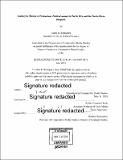| dc.contributor.advisor | Sasha Costanza-Chock. | en_US |
| dc.contributor.author | Rodríguez, Aziria D. (Rodríguez Arce) | en_US |
| dc.contributor.other | Massachusetts Institute of Technology. Department of Humanities. | en_US |
| dc.coverage.spatial | nwpr--- | en_US |
| dc.date.accessioned | 2018-09-17T15:48:58Z | |
| dc.date.available | 2018-09-17T15:48:58Z | |
| dc.date.copyright | 2018 | en_US |
| dc.date.issued | 2018 | en_US |
| dc.identifier.uri | http://hdl.handle.net/1721.1/117895 | |
| dc.description | Thesis: S.M. in Comparative Media Studies, Massachusetts Institute of Technology, Department of Comparative Media Studies/Writing, 2018. | en_US |
| dc.description | Cataloged from PDF version of thesis. | en_US |
| dc.description | Includes bibliographical references (pages 114-125). | en_US |
| dc.description.abstract | This thesis seeks to understand how different groups of people in Puerto Rico and the diaspora deploy internet memes for political critique. In this work, I analyze three case studies focused on how Puerto Rican groups and individuals use internet memes to express political discontent, make calls to action, engage in catharsis, and seek political change. The cases explore critical political meme production under varying circumstances on the island. The first case study, La Junta de Control Fiscal, is a group that uses Facebook to satirize the fiscal control board that was imposed on the island by the US Congress; they do this by making use of satirical socialist realist meme aesthetics, and visual vocabulary. The second case study, Puerto Rican vaporwave, explores the local deployment of an ironic, anti-capitalist aesthetic form of meme production and its transformation into a method of critique of colonialism and recovery of national identity. The third case study, Huracan Maria memes, focuses on how people use internet memes with varying aesthetics to express their frustrations and anger towards federal and state governmental disaster response before, during, and after the 2017 hurricane event. In each case, I gathered an archive of relevant internet memes, conducted content analysis, and interviewed key meme culture participants to get insight into the development process.Together, these case studies showcase the ways that Puerto Rican people make use of memes to tackle issues like climate change, colonialism, disaster response, and austerity measures. This thesis also develops new insights into the collective meme production process. In particular, the work demonstrates that participation within internet meme culture takes different forms. Meme culture participants perform four different types of engagement: original creation, remixing, curation and sharing. Furthermore, this work proves that internet meme production should be seen as a collective storytelling process where the distinct participation patterns shown above play a major role in expressing catharsis, ideas, sensations, and feelings. I conclude with thoughts about how to extend the communicative capabilities of political memes through new media technologies, and suggest new avenues for meme research. | en_US |
| dc.description.statementofresponsibility | by Aziria D. Rodríguez. | en_US |
| dc.format.extent | 125 pages | en_US |
| dc.language.iso | eng | en_US |
| dc.publisher | Massachusetts Institute of Technology | en_US |
| dc.rights | MIT theses are protected by copyright. They may be viewed, downloaded, or printed from this source but further reproduction or distribution in any format is prohibited without written permission. | en_US |
| dc.rights.uri | http://dspace.mit.edu/handle/1721.1/7582 | en_US |
| dc.subject | Comparative Media Studies. | en_US |
| dc.subject | Humanities. | en_US |
| dc.title | Seizing the memes of production : political memes in Puerto Rico and the Puerto Rican Diaspora | en_US |
| dc.type | Thesis | en_US |
| dc.description.degree | S.M. in Comparative Media Studies | en_US |
| dc.contributor.department | Massachusetts Institute of Technology. Program in Comparative Media Studies/Writing | en_US |
| dc.identifier.oclc | 1051214701 | en_US |
